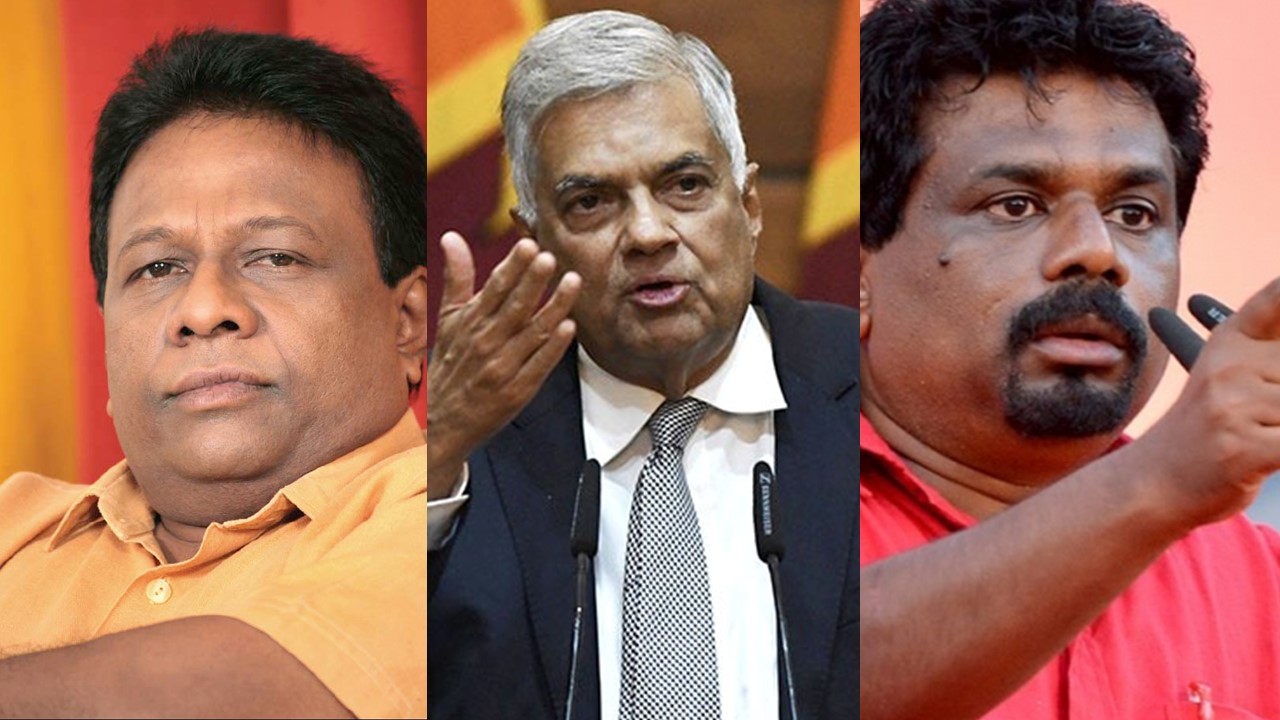
Tomorrow Sri Lankan parliamentarians will elect the next President of Sri Lanka following the resignation and departure of Gotabaya Rajapaksa from the island.
Infighting has left Sri Lanka’s ruling party, the Sri Lanka Podujana Peramuna (SLPP), fractured on whether to support the current acting president, Ranil Wickremesinghe, or their own member Dullas Alahapperuma.
This morning, Sajith Premadasa, the leader of Sri Lanka’s largest opposition party the Samagi Jana Balawegaya (SJB), has withdrawn from the race and vowed to support the candidacy of Alahapperuma.
Tamil political parties are also divided on the issue, with the Tamil National Alliance (TNA) yet to declare who they will endorse whilst the Tamil National People’s Front (TNPF) maintaining that they will abstain from voting as no candidate will meet the demands of Tamils.
Ahead of this vote, Tamil Guardian examines the record of the primary candidates for president; Ranil Wickremesinghe, Dullas Alahapperuma, and Janatha Vimukthi Peramuna (JVP) candidate Anura Kumara Dissanayake.
Ranil Wickremesinghe
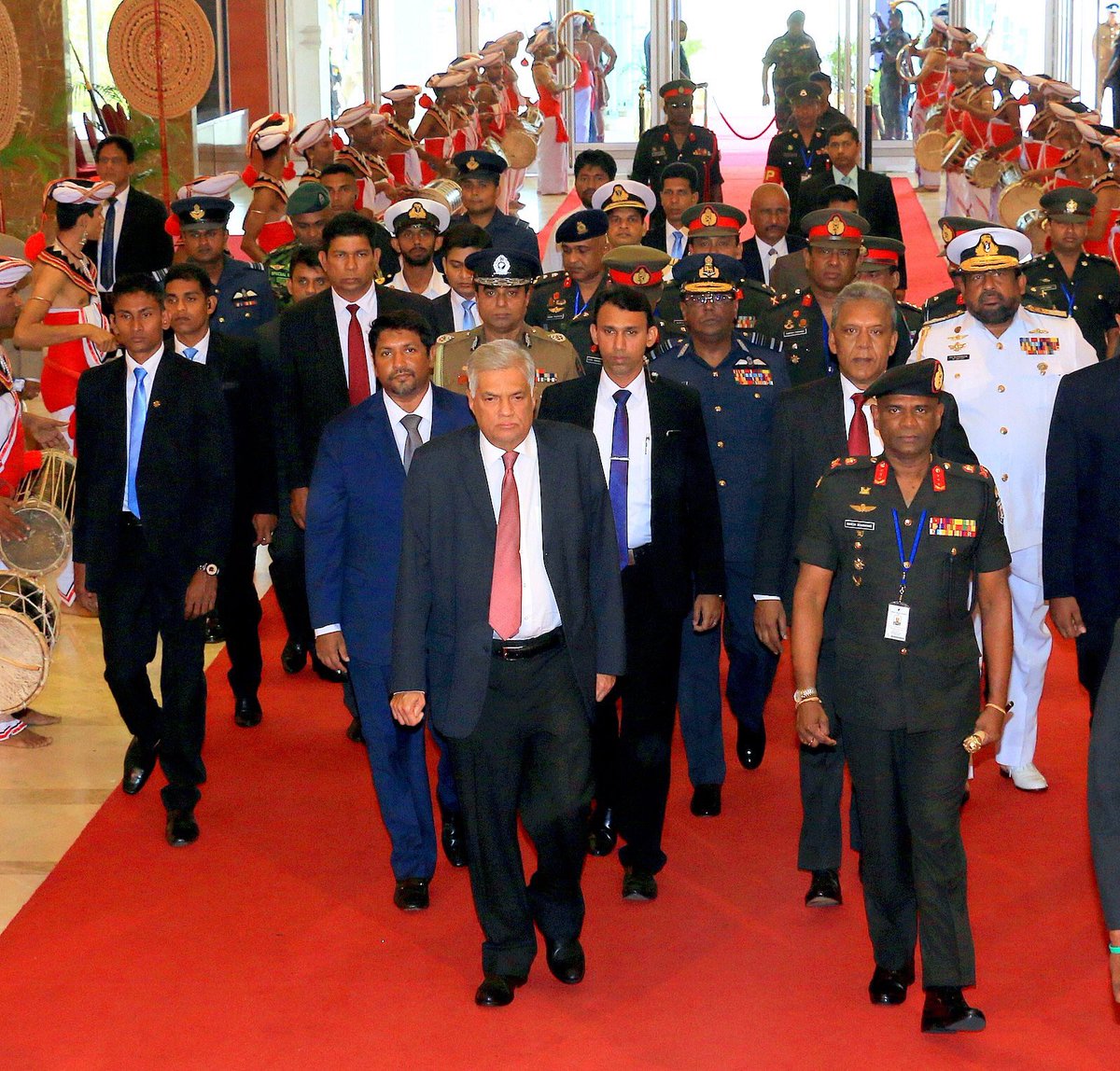
Ranil Wickremesinghe, the current acting president, has a lengthy history in Sri Lankan politics serving as Prime Minister of Sri Lanka from 1993 to 1994, 2001 to 2004, 2015 to 2015, 2015 to 2018, 2018 to 2019 and then being reappointed to the position by Gotabaya Rajapaksa in May of this year.
Wickremesinghe has in the past presented himself as the more liberal option, but has espoused many of the same policies as other Sinhala nationalists.
He has consistently upheld the Sinhala Buddhist nature of the Sri Lankan state, pledging that any constitution for the island would ensure Buddhism continues to hold the “foremost” place and denying there would be any federal solution to the ethnic conflict.
Wickremesinghe’s callous disregard for Tamil families was displayed in 2016 when twice claimed that the thousands who disappeared during the final phase of the armed conflict were “most probably dead”. In 2019, he would tell these families in Kilinochchi to “forget and move forwards”.
His comments came after his administration ignored the recommendations of its own Consultation Task Force in 2016, which called for an accountability mechanism for enforced disappearances. Instead, his government went on to set up an Office of Missing Persons (OMP), which came under heavy critique from families of the disappeared and was seen as a move to ease international pressure rather than answer the questions of the fate of their missing loved ones.
To this day, no one has been held accountable for Sri Lanka’s long history of enforced disappearances.
Wickremesinghe’s has also refused to hold the military to account for human rights violations and mass atrocities. In 2016 he would tell Sri Lankan parliament how it was throughout his tenure that Sri Lanka “refused to sign the Rome Statute which established the ICC” and how he "has no desire to send soldiers to any court". He even claimed that his ability to postpone UN resolutions “saved Mahinda Rajapaksa from the electric chair”.
In the 2020 Parliamentary elections, his party collapsed, securing only a single seat. He has since been elevated to the highest office in the land and kept a close relationship with Sri Lanka’s military. Responding to the unrest, he authorised the lethal use of force against demonstrators, which he presented as a “fascist” horde.
Read more about Wickremesinghe's record here: The return of Ranil Wickremesinghe - Sri Lanka appoints a new prime minister
Dullas Alahapperuma
.jpg)
Alahapperuma a lawmaker with Rajapaksa's SLPP is a staunch Sinhala Buddhist nationalist and close Rajapaksa ally.
Starting off his career as a Sinhala journalist, he was elected as an MP for the Matara District and served from 1994 to 2001. He would then return to parliament as a national list MP under Mahinda Rajapaksa and would reportedly go on to “spearhead” Rajapaksa’s presidential campaign.
Alahapperuma has consistently opposed Tamil demands. In 2013, as the Tamil National Alliance released a manifesto for the Northern Provincial Council elections, Alahapperuma compared it to the TULF’s 1976 Vaddukoddai Resolution, and labelled it “a cyanide capsule to the Tamil youth".
He has also not been shy over his fidelity to Sinhala Buddhist nationalism, being photographed alongside extremist politicians Sarath Weerasekara and Udaya Gammanpila waving a flag emblazoned with only the Sinhala lion. The flags have been associated with the racist ‘Sinha Le’ movement and other organisations accused of hate speech.
In 2016, he joined a protest outside the United Nations Human Rights Council in Geneva, where Sinhala demonstrators were denouncing further resolutions on accountability for mass atrocities. In previous years, as the global body passed resolutions on accountability in Sri Lanka, Alahapperuma vowed that protests would be held across the island against such a move.
Protestors held placards stating Sri Lankan troops were engaged in a “humanitarian mission” and for the protection of military “war heroes”.
Read more about his record here: Dullas Alahapperuma - Another racist throws his hat in the ring to be Sri Lanka’s next president
Anura Kumara Dissanayake
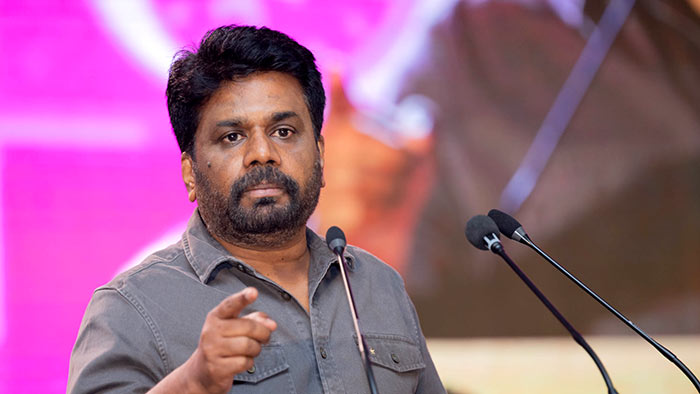
Dissanayake stands as the back runner, with the least chance of being elected to the position. He is the current leader of the self-proclaimed "Marxist” Janatha Vimukthi Peramuna, which for decades firmly opposed any devolution of power towards the Tamil homeland.
The JVP has a storied history in Sri Lanka having staged two insurrections against the state in the early 1970s and the late 1980s. The latter of these was chiefly in response to the Indo-Lanka accord and the threat of devolved powers to Tamils. Then leader Rohana Wijeweera framed Tamil demands for self-determination as in-hoc with US imperialist interests in his 1986 book “Solutions for Tamil Eelam Struggle”.
Throughout the armed conflict, the JVP would weaponise the pretence of Marxism to justify their hardline opposition to Tamil demands. In the 2004 parliamentary elections, the JVP became a coalition partner of the United Peoples Freedom Alliance (UPFA) and stood opposed to continued peace negotiations with the LTTE; they would further reject the possibility of joint post-tsunami aid distribution, and in 2005 endorsed Mahinda Rajapaksa on a platform specifically opposed to the peace process. In early 2006 the JVP openly promoted a military solution which would culminate in the Mullivaikkal genocide.
During peace talks between the LTTE and Sri Lankan government, the JVP would consistently protest against the ceasefire – slamming international mediation and the concept of granting devolution or autonomy to the Tamil homeland.
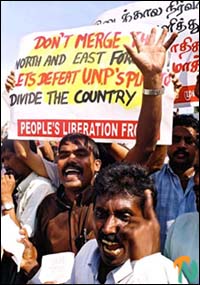
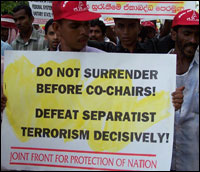
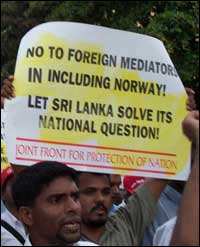
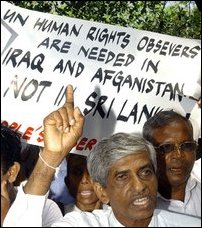
Anti-peace process protests by the JVP in 2002, 2006 and 2007. (Photographs: TamilNet)
The JVP’s staunch opposition to Tamil nationalism continues to this day. In 2016 Dissanayake attacked Tamil political parties insinuating that they were spreading hate in the country’s North. More recently, in September 2020, he called for the abolition of the provincial council system.
Whilst taking cover behind the rhetoric of Marxism, in practice, their politics differs little from the hard-line nationalism of the other candidates.
We need your support
Sri Lanka is one of the most dangerous places in the world to be a journalist. Tamil journalists are particularly at threat, with at least 41 media workers known to have been killed by the Sri Lankan state or its paramilitaries during and after the armed conflict.
Despite the risks, our team on the ground remain committed to providing detailed and accurate reporting of developments in the Tamil homeland, across the island and around the world, as well as providing expert analysis and insight from the Tamil point of view
We need your support in keeping our journalism going. Support our work today.
For more ways to donate visit https://donate.tamilguardian.com.

